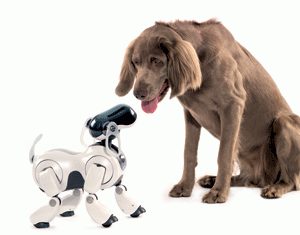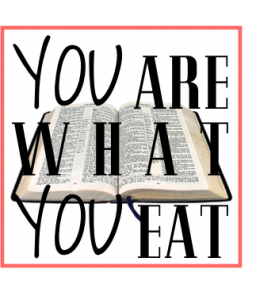 Going for my noon walk the other day, I approached a yard with two untethered dogs and no physical fence. “Do the owners use an invisible fence?,” I wondered (the kind of system that uses a shock collar to remind dogs of their boundaries). As I walked by, these dogs barked at me and ran toward me but I noticed they didn’t go past a certain point. Invisible Fence it was. As I walked on, I wondered how the dogs’ master knew these were the kind of hounds that would obey his shocking rules. After all, I’ve heard stories of dogs that, with enough temptation, would cross the line and withstand the punishment to achieve their end. Why didn’t the owner just invest in a standard fence? In fact why invest in a flesh and blood dog in the first place when you could purchase and program a robotic dog to achieve perfect obedience?
Going for my noon walk the other day, I approached a yard with two untethered dogs and no physical fence. “Do the owners use an invisible fence?,” I wondered (the kind of system that uses a shock collar to remind dogs of their boundaries). As I walked by, these dogs barked at me and ran toward me but I noticed they didn’t go past a certain point. Invisible Fence it was. As I walked on, I wondered how the dogs’ master knew these were the kind of hounds that would obey his shocking rules. After all, I’ve heard stories of dogs that, with enough temptation, would cross the line and withstand the punishment to achieve their end. Why didn’t the owner just invest in a standard fence? In fact why invest in a flesh and blood dog in the first place when you could purchase and program a robotic dog to achieve perfect obedience?
This Sunday’s first reading (Dt 8:2-3, 14b-16a) gives us the opportunity to put ourselves in those real dogs’ place—and their master’s. In it, Moses walks his people down memory lane.
“Remember how for forty years now the LORD, your God, has directed all your journeying in the desert, so as to test you by affliction and find out whether or not it was your intention to keep his commandments.”
Why did our all-knowing God need to test his people to make sure they would stay within their boundaries? Surely he was intimately familiar with the nature of his creatures. That’s the point. Our nature was hardwired for free will, so after He created us and gave us some strict rules He let us off our leash. If He had wanted cyborgs we wouldn’t need to worry about the consequences of crossing God’s line. But ours is a God of love, and that’s a gift that can only be received and returned by beings gifted with free will and with an appetite for life. As such we crave a flesh and blood God as much as He wanted flesh and blood creatures. He came to us in the form of Jesus Christ, whose flesh and blood we consume so it becomes part of us and we become part of Him, as  Paul told the Corinthians in our second reading (1 Cor 10:16-17):
Paul told the Corinthians in our second reading (1 Cor 10:16-17):
The cup of blessing that we bless, is it not a participation in the blood of Christ? The bread that we break, is it not a participation in the body of Christ?
Paul learned well from his Master, as our gospel reading testifies by quoting what Jesus taught (Jn 6:51-58):
“I am the living bread that came down from heaven; whoever eats this bread will live forever; and the bread that I will give is my flesh for the life of the world.”
God fed Moses and his people manna from heaven to teach them that “not by bread alone does one live, but by every word that comes forth from the mouth of the LORD.” That word would later become the flesh of the Living Word of God. By staying faithful to our Master’s 10 basic commands, we’ll not only continue to be fed by His Word, but we’ll become what we eat—creating living testimonials suitable for global consumption.
–Tom Andel